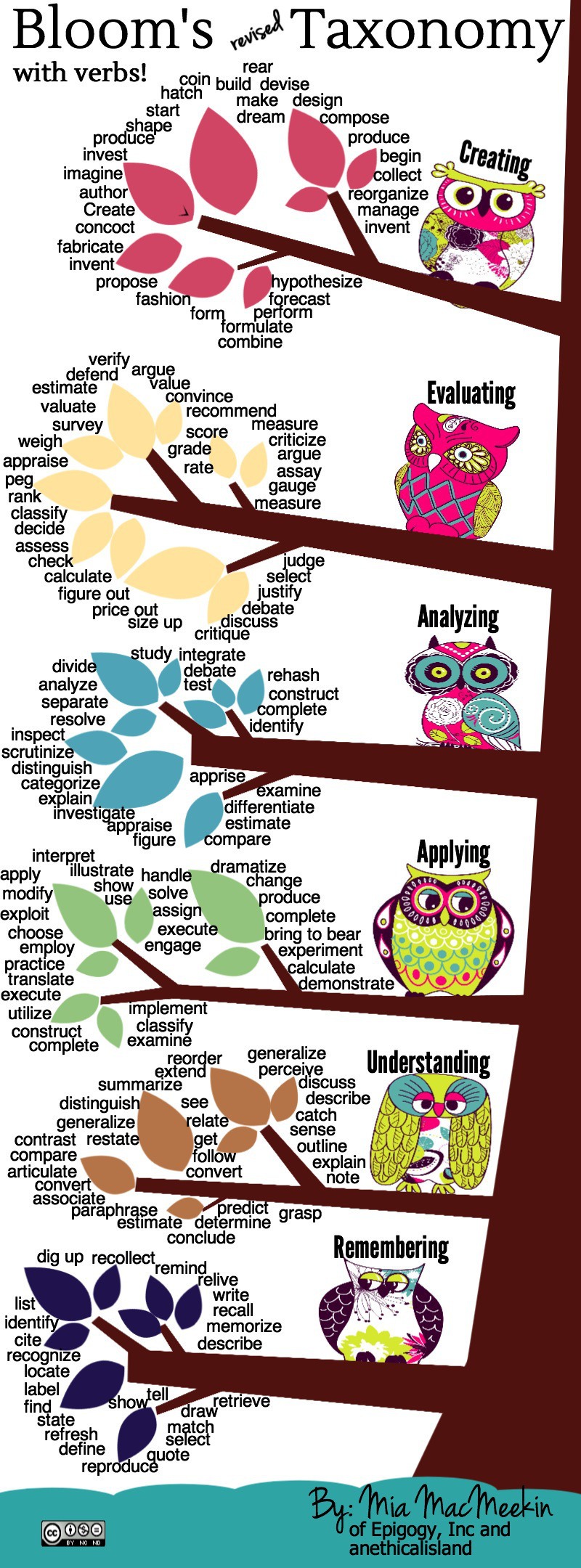Blooms Taxonomy Printable – Bloom’s taxonomy is a hierarchical model that outlines six categories of learning and application skills that progress from less to more complex. Students will be able to. Make a scrapbook about the areas of study. Bloom’s taxonomy of measurable verbs. The two graphics show the revised and original taxonomy. Revised bloom’s taxonomy process verbs, assessments, and questioning strategies. Comparing, translating, interpreting, giving descriptions, and stating main ideas. Benjamin bloom and colleagues (1956) created the original taxonomy of the cognitive domain for. Students can use this learning tool to develop questioning strategies for each of the six (recently updated) levels. Tablish behaviors accommodate progressions pedagogy.

Bloom's Taxonomy Education Table
Additional information about bloom’s revised taxonomy is available here: Examine and break information into parts by identifying motives or causes. The theory is based upon the. Students can use this learning tool to develop questioning strategies for each of the six (recently updated) levels. A taxonomy for learning, teaching, and assessing.

Bloom's Revised Taxonomy Action Verbs infographic eLearning Infographics
Each of the three categories requires learners to use different sets of mental processing to achieve stated outcomes within a learning situation. Lorin was bloom’s taxonomy of learning taxonomy anderson,. General form of a learning objective: In 1956, benjamin bloom headed a group of educational psychologists who developed a classification of levels of intellectual behavior important in learning. Tablish behaviors.

Bloom's Taxonomy Verbs Free Classroom Chart
Each of the three categories requires learners to use different sets of mental processing to achieve stated outcomes within a learning situation. A statement of an objective contains a noun (type of knowledge) and a verb (type of cognitive process using the knowledge). Tablish behaviors accommodate progressions pedagogy. A taxonomy for learning, teaching, and assessing, abridged edition. The theory is.

Bloom’s Taxonomy The Landscape of EE
General form of a learning objective: A statement of an objective contains a noun (type of knowledge) and a verb (type of cognitive process using the knowledge). A taxonomy for learning, teaching, and assessing, abridged edition. Lorin was bloom’s taxonomy of learning taxonomy anderson,. Solve problems to new situations by applying acquired knowledge, facts, techniques and rules in a different.

Bloom’s Taxonomy Gymnastics
Bloom’s taxonomy of measurable verbs. Make a diorama to illustrate an important event. The skills at the top of the pyramid are often. Students will be able to. A taxonomy for learning, teaching, and assessing, abridged edition.
Students Will Be Able To.
General form of a learning objective: Solve problems to new situations by applying acquired knowledge, facts, techniques and rules in a different way. Examine and break information into parts by identifying motives or causes. A taxonomy for learning, teaching, and assessing, abridged edition.
Make A Scrapbook About The Areas Of Study.
Lorin was bloom’s taxonomy of learning taxonomy anderson,. Tablish behaviors accommodate progressions pedagogy. Bloom’s taxonomy is a hierarchical model that outlines six categories of learning and application skills that progress from less to more complex. Benjamin bloom and colleagues (1956) created the original taxonomy of the cognitive domain for.
Benjamin Bloom Created A Taxonomy Of Measurable Verbs To Help Us Describe And Classify Observable Knowledge, Skills, Attitudes, Behaviors And Abilities.
Bloom’s taxonomy of measurable verbs. Updated the taxonomy to reflect relevance to 21st century work. The two graphics show the revised and original taxonomy. Comparing, translating, interpreting, giving descriptions, and stating main ideas.
Students Can Use This Learning Tool To Develop Questioning Strategies For Each Of The Six (Recently Updated) Levels.
The skills at the top of the pyramid are often. In 1956, benjamin bloom headed a group of educational psychologists who developed a classification of levels of intellectual behavior important in learning. Revised bloom’s taxonomy process verbs, assessments, and questioning strategies. Additional information about bloom’s revised taxonomy is available here: